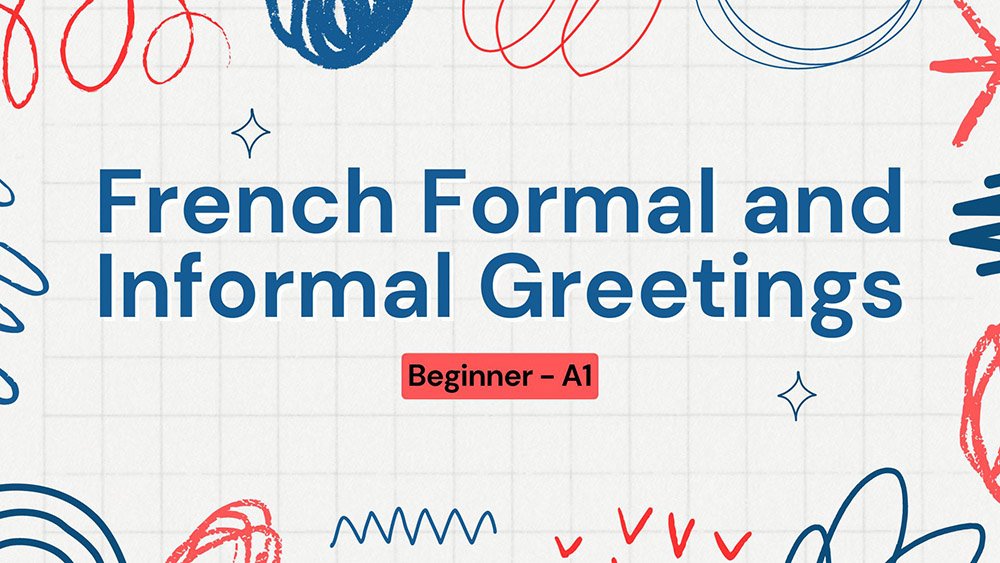Bonjour à tous! Welcome back to our French lesson series. Today, we’re diving into the art of greetings and goodbyes in French. Whether you’re meeting someone for the first time or chatting with friends, knowing how to start and end conversations is key! Let’s get started.
[lwptoc]Formal Greetings
First up, formal greetings. These are crucial in professional settings or when you’re speaking to someone you don’t know well. The classic words to say hello in French are:
- Bonjour (hello, good morning)
- Bonsoir (good evening)
To make it even more polite and formal you can add Monsieur (Sir), Madame (Madam), Mademoiselle (Miss):
- Bonjour Monsieur
- Bonsoir Madame
If you know their last name, you can also add it in:
- Bonjour Madame Martin
- Bonsoir Monsieur Dupont
How Are You?
A very common way to start a conversation is to ask the person how they are. Let’s take a look at how to do that in a formal way:
- Comment allez-vous ?
- Vous allez bien ?
To answer this, you can say:
- Je vais bien / Ça va / Ça va bien (you are fine)
- Je ne vais pas très bien (you are not feeling too good)
- Ça ne va pas (you are not doing well)
- Et vous? (what about you?)
Meeting for the First Time
When you meet someone for the first time, after you have exchanged your bonjours and said your name, it is common practice to say enchanté(e), for “nice to meet you”. If you are a man, it will be spelled enchanté. If you are a woman, you will need to add an extra “e”: enchantée. regardless, the pronunciation remains the same.
Informal Greetings
Now, let’s loosen up with some informal greetings. These are used among friends or in casual settings. To say hello in an informal way in French, here are your options:
- Salut ! (hi!)
- Coucou ! (hey there!)
- Ça va ? (how’s it going? / how are you doing?)
How Are You?
There are various ways of asking “how are you” in an informal setting in French, here is what you can say and what you can answer:
- Ça va?
- Tu vas bien?
- Comment ça va ?
- Comment tu vas ?
You can answer:
- Ça va ! / Ça va bien (you are fine)
- Ça va super ! (you are doing great)
- Bof / moyen (so-so)
- Pas terrible (not great)
- Ça ne va pas (you are not fine)
- Et toi? (what about you?)
Quick Word About “Comme Ci, Comme Ça”
I wanted to add a word about the famous expression “comme ci, comme ça” which is often taught as a way to answer “so-so”. While this expression exists and will be understood by any French person, it is not really used in real life. If you want to talk like a French, don’t use it.
Saying Goodbye
Just like saying hello, saying goodbye can be done in different ways, using different words and expressions, depending on who you are talking to (formal or informal situation).
Formal Situations
The go-to expression to say goodbye in French in a formal situation is au revoir. Another expression that works well is bonne journée, which means “have a good day”. Actually, you could also say that to a friend or family member, so it is not only formal.
Just like what we have seen earlier for “hello”, it is perfectly possible to add Monsieur or Madame:
- Au revoir Monsieur Dupont
- Au revoir Madame Martin
Informal Situations
If you remember, one very common way to greet your friend is saying salut !. Well, the most common way to say goodbye to a friend is also salut !. Another commonly used expression is à plus ! which is the equivalent of “see you!” in English.
Some people also use Ciao ! which actually is an Italian word to say goodbye informally. The use of this word is more a question of habit that can vary from person to person. But it is relatively common as well.
Neutral Expressions
There are many ways to say goodbye. Some of them include things like “see you soon”, “see you on Monday” or similar expressions that are totally fine to use in both formal and informal situations. Let’s take a look at some of them:
- Bonne journée ! (have a good day!)
- Bonne soirée ! (have a good evening!)
- Bon week-end ! (have a good weekend!)
- Bonne nuit ! (good night!)
- À bientôt ! (see you soon!)
- À toute à l’heure ! (see you later!) – often shortened as “à toute !” in informal situations
- À demain ! (see you tomorrow!)
- À Lundi ! (see you on Monday!)
Example Dialogues
Example #1: Formal Situation
- Bonjour Monsieur
- Bonjour !
- Comment allez-vous?
- Je vais bien, merci, et vous?
- Ça va, merci
- [conversation]
- Au revoir
- Au revoir Monsieur !
Example #2: Informal Situation
- Salut Julien !
- Salut Frank !
- Ça va ?
- Oui, ça va, et toi ?
- Bof…
- [conversation]
- Salut !
- À plus !
Recap Tables
Saying Hello
| Formal situation | Informal situation |
|---|---|
| Bonjour (+ Monsieur / Madame / Mademoiselle) Bonsoir (+ Monsieur / Madame / Mademoiselle) Comment allez vous ? Vous allez bien ? Et vous ? | Salut ! Coucou ! Ça va ? Comment tu vas ? Tu vas bien ? Et toi ? |
Saying Goodbye
| Formal situation | Informal situation | Neutral |
|---|---|---|
| Au revoir (+ Monsieur / Madame / Mademoiselle) | Salut ! À plus ! Ciao ! | Bonne journée ! Bonne soirée ! Bon week-end ! Bonne nuit ! À bientôt ! À toute à l’heure ! À demain ! À [day of the week] ! |

